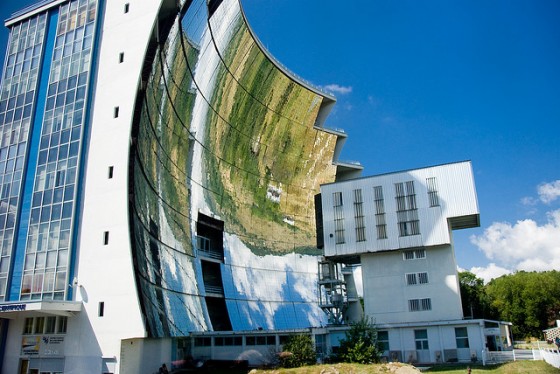The next generation of utility-scale CSP reflectors may favor metals and plastics.
With the latest revelation that Saudi oil is expected to plateau within the next fifteen years, there is more incentive than ever to fast-track renewable energy plants. The 1980 Solar Energy Generating Station in California (SEGS) has provided new solar developers with lessons learned, but there is a hitch. The glass used in first-generation utility-scale solar plants would never pass muster today. In order to pass environmental regulations that prohibit leaded paints and copper previously used, sturdy glass panels for CSP reflectors cost a small fortune to manufacture. A prohibitive fortune at that. Some industry experts claim that unless those costs come down, less costly and more flexible alternatives might soon dominate the market.
According to a report published on CSP Today, the Environmental Protection Agency (EPA) would never permit sale of the California SEGS glass today. In fact, the only place to purchase that kind of glass today is in China, according to Cheryl Kennedy, the senior scientist and CSP advanced optical materials project leader at the US National Renewable Energy Laboratory (NREL) in the United States, and then they would have to be disposed as toxic waste.
Flabeg and Rioglass use unleaded paints, but even these are not 100% reliable, since the paints were tested for indoor applications.
In order to manufacture the appropriate crystal-clear low-iron glass for CSP reflectors, glass-makers require low-iron sand and an ultra high temperature oven that can’t have any impurities.
Glassmakers will currently assign an oven to produce several months’ worth of product in a few weeks, but even so the expense involved results in a high unit cost; it reportedly takes around USD$250,000 a day just to clean out the oven, according to CSP Today.
Kennedy claims that costs could stabilize if the international demand was such that the ovens were run continuously for nine out of twelve months, but at the moment, that is not the case. Other options require less labor, which accounts for almost half the cost of most solar panels, break less easily, and allow for greater freedom of design.
Operations Manager at Patriot Solar Group, Ken Sexton claims that lower-cost acrylic mirrors can be used in small CSP systems, while anodized aluminum that “you can bang out on a press” is idea for larger projects.
Rand Gee, who is President of SkyFuel, suggests that glass mirrors break more easily and encroach on flexibility. He adds that it isn’t necessary to have a $60million factory just to build mirrors. He says that his systems are also further ahead on accelerated weathering data with 25 years under their belt already.
Longstanding glass-makers note that cost is relative. Jordi Villaneuva from Rioglass Solar told the paper that many of their clients who first opted for alternatives to glass ended up replacing all of their reflectors within three years.
For now, glass is the tried and true option, and most new plants are using it to populate their reflectors. But if the costs don’t decrease measurably, the bang out option might just prevail.
:: CSP Today
More on Solar Energy in the Middle East:
The Early Bird Gets the Sun: MENASOL 2011
Top Five Best MENA Locations For Solar Energy
image via david.nikonvscanon


Comments are closed.